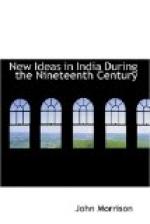[Sidenote: Dynamical elements of Christianity.]
[Sidenote: Dynamical doctrines in other spheres]
To the student of Christianity, again, that same concurrent testimony is profoundly interesting. Certain Christian ideas are being assimilated in India. Certain cardinal aspects of Christianity are proving themselves possessed of inherent force and attractiveness. They are showing that they possess force not from authority, or tradition, or as part of a system of doctrine, or as racially fitting, but when presented in new and often very unfavourable surroundings. Borrowing an expression from physical science, certain elements of Christianity are proving themselves dynamical. For in non-Christian India, ecclesiastical authority or tradition and the system of Christian doctrine as such, possess no force. By illustrations from other spheres, let us make clear what is meant by such dynamical elements of Christianity. The doctrine of the Origin of Species by means of Natural Selection was put before the world by Darwin in 1859, and within the half century has been accepted almost as an axiom by the whole civilised world. Undoubtedly that doctrine has proved itself dynamical. On the other hand, a few years earlier than the publication of The Origin of Species, another body of new doctrine was propounded to Britain and the world, and strongly urged by its upholders, namely, the doctrine of Free Trade—the advantage to the community of buying in the cheapest market. True or false, that body of doctrine has not proved dynamical among the nations, for the great majority of peoples still repudiate the doctrines of Free Trade. Similarly certain elements of Christianity are commending themselves to new India, and certain others are failing to do so at this time.
[Sidenote: Illustrations from the history of Christianity.]
From century to century these dynamical elements of Christianity may vary; and it is profoundly interesting to the student of the history of religious beliefs to observe the variation. In the early apostolic times, when the apostles and disciples were “scattered abroad,” we see plainly in the Acts of the Apostles that the dynamical element of Christianity is the Resurrection of Our Lord. It is that which tells, and His coming reign—with Jewish audiences in particular. It was, e.g., the manifestation of Christ to St. Paul on his way to Damascus that completed the conversion of his life. And so, repeatedly throughout the record of the Acts of the Apostles, they are described as witness—bearers of the resurrection to the outside world. [Greek: Megale dynamei], “with great power gave the apostles their witness of the resurrection of the Lord Jesus; and great grace was upon them all."[49] And yet—dynamical elements vary—in the different atmosphere of Athens (we are twice told in so many words) this same resurrection of Christ dug a gulf between St. Paul and the Athenians.[50]




